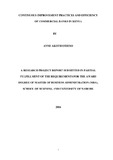| dc.description.abstract | Continuous improvement, a quality philosophy that will always ensure continued improvements and ensures a workable process that should be constantly monitored for further improvements. With main objective of the study was to determine the relationship between continuous improvement practices and efficiency. The study adapted a descriptive survey research design, which was exploratory in nature to obtain qualitative information. The target population were branch managers of 39 Commercial banks. For the study, a questionnaire was the preferred instrument for data collection and before the study was conducted, the questionnaire was pre-tested to gauge its validity and reliability. The researcher issued out 39 questionnaires and received 100% response rate. Data analysis with the help of SPSS illustrated the relationship between continuous improvement practices and efficiency of commercial banks. The findings revealed that continuous improvement practices considered in this study namely customer focus; engagement of people, quality improvement programs, leadership and factual approach to decision making had a positive relationship with organizational efficiency. Additionally, the relationship was significant at 95% confidence (p<0.05) for all the five continuous improvement practices implying that they are important factors affecting organizational efficiency of banks. When the relationship between each continuous improvement practices and organizational efficiency was considered individually, factual approach to decision-making, customer focus and quality improvement programs had a strong positive correlation with organizational efficiency while engagement of people and leadership had a weak relationship with organizational efficiency. Additionally, factual approach to decision making, customer focus and quality improvement programs has been implemented to a large extent, engagement of people to a moderate extent and leadership to a small extent. The study therefore recommends that banks should improve leadership and people engagement. | en_US |



